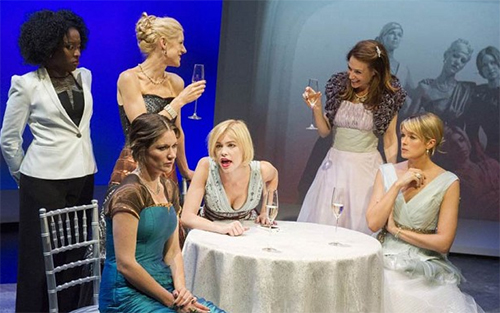Translate Page

Actors from Broadway and Hollywood make frequent forays to London’s theatreland, just as West End actors are often Broadway regulars. The same is true for original plays. London has recently seen Jon Robin Baitz’s Broadway hit Other Desert Cities, for instance, while Broadway is soon to get the transfer of The Curious Incident of the Dog in the Night-Time from the National Theatre.
Typically, of course, American plays launch in America before heading across the ocean (and vice versa). But at the moment, playwright Adam Bock, a Montreal native who’s based in New York City, is thwarting that trend. Though he has a long history of New York productions, his latest play, The Colby Sisters of Pittsburgh, Pennsylvania, is currently making its world premiere at London’s Tricycle Theatre.
“This is my dream,” says Bock, sitting in the Tricycle’s foyer bar on a break from rehearsals. “When I thought about what I wanted from a career in the theatre, it was that the best thing would be to go to different places and do a show with other people. The idea of leaving New York City—having a little break and going somewhere else—was fabulous.”
{Image1}
The journey began when Indhu Rubasingham, the Tricycle’s artistic director, met Bock and director Trip Cullman at the Sundance Theatre Lab in Utah. “She goes there to comment on plays,” Bock says, adding that he and Cullman, a frequent collaborator, went to Sundance to overhaul the Colby Sisters script. “We were there for three weeks and we had six actors. I’d actually written it all before we began, but at the first rehearsal, I found that everything had to change after two scenes.”
The play arose from a quirk of the acting community: “There are five actresses in New York who look quite alike, and I thought it would be so much fun to have them together on the same stage,” Bock says. “Usually they audition against each other, because they’re the same type. They go up for the same parts and never get to play together.”
Those five actresses duly performed the play’s first reading in New York. But more than that, they gave Bock a rare opportunity. “There are so few plays where there are just women on stage,” he says. “I don’t know why. There are lots of plays with just men. So I also thought I’d like to see a play where this happened and what they would do. They’re all blonde and beautiful or a certain type, and all close to each other in age. What it did was let me talk about family dynamics, but hopefully in a new way.”
The show also reflects a personal preoccupation: “I’m really interested in how once you are seen in a particular role, it is difficult to get out of it. Once people assume you are going to be a certain way, they encourage you to keep being that way and don’t expect you to change. Or really let you change. If you wake up and think you need to do things differently, it is very hard to do that. This play is about someone who is very controlling and how hard it is to deal with people who are.”?It is also, he quips, “about galas and hair and dresses and surface, and how it can all fall apart.”
As a gay man, Bock says he’s noticed how “gay guys I know have these beautiful packages, and how hard it is not to be packaged. They’re really talented at something or they’re in perfect shape or they can cook well—everything has to be done just right. And people feel they are falling apart if they don’t do that. They’re caught in the packaging and a role, and as a result they don’t get to tell the truth or be real. And that’s something I struggle with: how to be an authentic person in the face of thinking I should behave in a certain way that people want me to.”
He’s been breaking those rules and expectations in plays he’s been writing since he was in third grade. At the time, two classmates put on a version of Charlie and the Chocolate Factory “and made me the Oompa Loompa. I was so annoyed I went home and wrote James and the Giant Peach and cast myself as James.”
He subsequently trained as a writer with Pulitzer Prize-winning playwright Paula Vogel at Brown University in Rhode Island. For the past several years he has been sharing his love of theatre with New York City high school students through Theatre Development Fund’s Open Doors program. Through Open Doors, Bock works with eight New York high school students every year, introducing them to the professional theatre. “It gives them the sense that this world is possible,” he says.
And coming to the Tricycle, he’s been reminded of another possibility. “Theatre is supposed to be communal,” he says. “You’ve got to be part of a group of people making something together. And that’s what happens here.”
—
Mark Shenton is a London-based theatre critic for The Stage and London correspondent to Playbill.com and TDF Stages. Twitter: @ShentonStage
Production photo by Alastair Muir